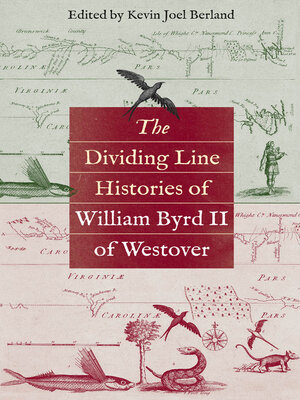The Dividing Line Histories of William Byrd II of Westover
ebook ∣ Omohundro Institute of Early American History and Culture and the University of North Carolina Press
By Kevin Joel Berland

Sign up to save your library
With an OverDrive account, you can save your favorite libraries for at-a-glance information about availability. Find out more about OverDrive accounts.
Find this title in Libby, the library reading app by OverDrive.



Search for a digital library with this title
Title found at these libraries:
| Library Name | Distance |
|---|---|
| Loading... |
After his 1728 Virginia–North Carolina boundary expedition, Virginia planter and politician William Byrd II composed two very different accounts of his adventures. The Secret History of the Line was written for private circulation, offering tales of scandalous behavior and political misconduct, peppered with rakish humor and personal satire. The History of the Dividing Line, continually revised by Byrd for decades after the expedition, was intended for the London literary market, though not published in his lifetime. Collating all extant manuscripts, Kevin Joel Berland’s landmark scholarly edition of these two histories provides wide-ranging historical and cultural contexts for both, helping to recreate the social and intellectual ethos of Byrd and his time.
Byrd enriched his narratives with material appropriated from earlier authors, many of whose works were in his library — the most extensive in the American colonies. Berland identifies for the first time many of Byrd’s sources and raises the question: how reliable are histories that build silently upon antecedent texts and present borrowed material as firsthand testimony? In his analysis, Berland demonstrates the need for a new category to assess early modern history writing: the hybrid, accretional narrative.
Byrd enriched his narratives with material appropriated from earlier authors, many of whose works were in his library — the most extensive in the American colonies. Berland identifies for the first time many of Byrd’s sources and raises the question: how reliable are histories that build silently upon antecedent texts and present borrowed material as firsthand testimony? In his analysis, Berland demonstrates the need for a new category to assess early modern history writing: the hybrid, accretional narrative.







